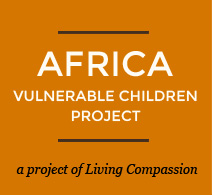We need new ways to express that days are big here. I suppose if we came for long periods of time we would settle into a rhythm where some days we take a leisurely lunch in the middle of the day or every now and then have a day where we do not do any business. As it is, everyday is packed with forward movement.
Today began in Kantolomba with a meeting of the entire community. Upon arriving Theresa and I discovered that the Coordinator had misrepresented the gathering (meetings in Kantolomba are called by someone walking through the compound with a megaphone announcing the time, place and purpose of the gathering). He had told people that they should meet at 10 hours on Saturday morning to come collect plastic for their roofs. In fact, the main purpose of the meeting was to inform the community about the garbage collection program that is soon to commence. We had also planned to use the opportunity to tell people about how the plastic for the roofs was to be distributed, but the plastic is not yet ready and it was certainly not the reason for the gathering. Both Theresa and I were dismayed that many folks’ first impression of Living Compassion was going to be one of disappointment—we came here to get our plastic and that is not happening. The Coordinator explained that he thought three-quarters of the people showed up to the meeting only because they want their plastic, and they would not have come had they known there was no plastic ready. We replied that if there are people who would not care to attend a meeting laying out a plan for how we can work as a community to clean-up Kantolomba, then those are not people we would want at the meeting anyway. Theresa and I quickly hatched a plan for explaining the miscommunication, reminded each other that working with women is a good idea, and let it go to clear a space for a successful meeting.
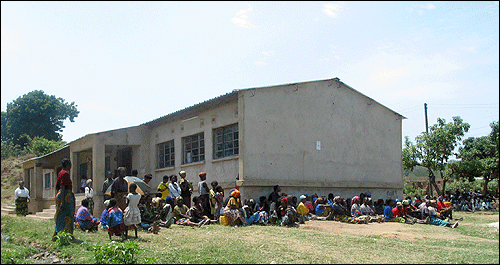
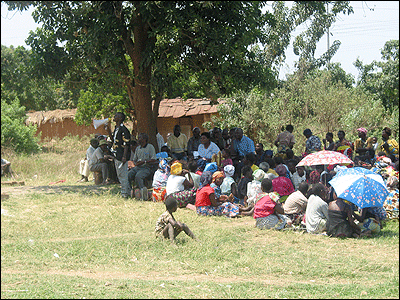 We were gathered in an outdoor area with several hundred people sitting on the ground—the women in two large groups, the men in another. The “PA system” was the same megaphone used to call the meeting. The Coordinator began with a prayer, followed by a welcome from an RDC representative. It was then our turn to lay out the purpose for the meeting. I inadvertently broke the ice by pushing a wrong button on the megaphone, setting off a large siren, and making a funny face indicating I did not know how to use this thing. It was a moment of great entertainment. We then proceeded to explain the plan for garbage collection—me saying one sentence at a time, Mr. Kayula following with the translation into Bemba. We were able to explain how important the project is for curbing onset of disease as the rains begin. There was great support. One of the most popular moments was when we explained that people would be paid a small fee for each bucket of garbage collected.
We were gathered in an outdoor area with several hundred people sitting on the ground—the women in two large groups, the men in another. The “PA system” was the same megaphone used to call the meeting. The Coordinator began with a prayer, followed by a welcome from an RDC representative. It was then our turn to lay out the purpose for the meeting. I inadvertently broke the ice by pushing a wrong button on the megaphone, setting off a large siren, and making a funny face indicating I did not know how to use this thing. It was a moment of great entertainment. We then proceeded to explain the plan for garbage collection—me saying one sentence at a time, Mr. Kayula following with the translation into Bemba. We were able to explain how important the project is for curbing onset of disease as the rains begin. There was great support. One of the most popular moments was when we explained that people would be paid a small fee for each bucket of garbage collected.
Once the trash plan was clear, we moved on to the plastic, explaining that it will take some time to buy and distribute the 12 meter pieces of plastic to all 753 households that need it (the Coordinator had gone house to house assessing which houses will not make it through the rainy season). We asked for people’s patience as we move forward.
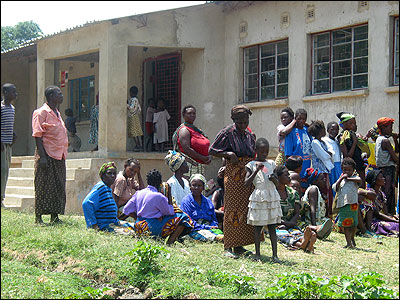
General consensus afterward was that the meeting was a success, that people understood clearly how the projects will happen. Unfortunately, the staff from the Health Department had car trouble on the way to the meeting and arrived just as we ended. We confirmed with them that the garbage truck will arrive in Kantolomba at 10:00 a.m. on Wednesday morning. Mr. Kayula is going to invite the local press and Mr. Katoti, the head of the Health Department, plans to be there.
Just as we were leaving, the teenagers in charge of carrying out the informal census arrived. We checked in with them and made a plan to complete the data collection by November 4.
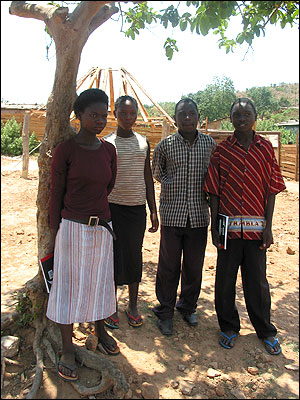
We then headed to the Living Compassion house to visit with the children and to walk through the property to plan for some repairs and maintenance. Ignatius, the father in the household, has been employed on a special security task force by the copper mines just over the border in the Democratic Republic of Congo. It is a big job and one that has him away from the household more than 16 hours per day. It had become apparent over our last two visits in Zambia that the demands on Ignatius juggling these two positions— the new job at the mines and his role in Living Compassion—was too much. The Kapendas had met just prior to our arrival for this visit and had decided it would be best if Theresa took over the role as the head of the Living Compassion household. Grace and Ignatius will move out, Theresa will move in. We are in full support of this decision as the children are thrilled (they LOVE Theresa), and she will have far more time to devote to them. We are taking the opportunity of the shift to bring the house into good working order.
Pauline, our newest Living Compassion colleague (with her initiative, skills, and big heart we couldn’t help but bring her on as a part-time staff member), met us at the house for a walk-through. One of Pauline’s responsibilities at the Savoy is a weekly inspection of all the facilities. As she says, that doesn’t mean anyone does anything about what she notes, but she does know what to look for. She also has many connections to people who can fix just about anything. We made a plan to clean up the grounds, fix some wiring and plumbing, and put a fresh coat of paint in several rooms.
As always, it was great to see the children. We are becoming more and more comfortable with each other. When we walked in the house this time, Hope walked over to me to be picked up. She then began announcing (in Bemba), “Daddy, the musungu has come.”
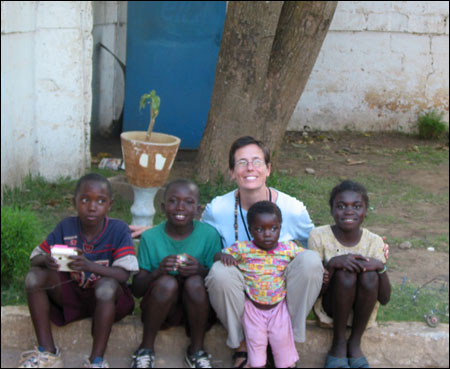
After the house visit we released Mr. Kayula and Pauline but, alas, Theresa and I still had work to do. I tease Theresa that she can sleep after I leave. We went back to the Guest house to go over documents I had drafted detailing the tasks related to Living Compassion, Zambia. Theresa was very supportive of following this document closely so we are all clear on what is expected of each of us. We set a meeting for 4:00 p.m. on Monday to go over the whole document with Pauline and Mr. Kayula. We are getting quite organized over here at our Zambian headquarters!
While Gershom drove Theresa home, I went to the internet café to print the documents in preparation for several Monday meetings and to check email. With each email taking 5 minutes to load, we attend to only the most necessary communications. All else will have to wait for our return.
I arrived home close to exhausted, immediately took a hot shower, drank a cup of tea, and sat in meditation. Just moments before my meditation ending bell was set to ring, there was a light knock on my door. It was Douglas, the charming evening cook here at the Guest House, telling me I had a visitor. A visitor?? Geez! I’m tired. I need a break. I remembered halfway through asking who it was that I had suggested to Elvis that he come by the Guest House on Saturday evening. He had followed my instructions. I went out to greet him. He explained that he and his three siblings were about to be evicted from their rented house. At 15 he is the head of his household. Their father died in April, 2005, of TB and mother in May of this year of cerebral malaria. None of their relatives is able and/or willing to take them in. He struggles to do odd jobs to pay for the rent, food, and school fees while remaining in school himself. According to what he told me now, he is currently not succeeding. We had already agreed that we would pay his school fees, and I went to get a paper and pen to write his name and grade so I could go to his school directly to pay the fees.
As I walked down the hall and remembered my desire for “a break” this evening, I realized there are no breaks from being orphaned, no breaks from hunger, no breaks from struggling to keep your young siblings alive, no breaks from extreme poverty. I felt grateful for the peace and calm that meditation had afforded me, giving me the opportunity to be fully present with Elvis. We talked for some time, him laying out what life is like for him and me mostly listening. He is asking for help, of course, and I find I feel far better equipped to respond in this situation than even a few months ago. I listen attentively and reflect back, indicating I have heard him. I know now that I have a strong team who will help and I do not need to figure out what to do about this by myself. I ask Elvis to meet at the Savoy Hotel on Monday at 5:00 p.m., knowing that I can discuss this with our Zambian team at our 4:00 meeting and they can help decide a strategy. It would be easy to just hand him a 50,000 kwacha note right now, but is that in keeping with how Living Compassion is now operating here? Would that serve Elvis? Might there be a better, more holistic approach? Someone on the team will have an idea, I feel sure.
As Elvis left, I noted that I felt cared for at the end of the interaction rather than drained. Practice and service are a powerful pair.
I headed to the kitchen to prepare my gourmet meal of canned lentil soup, cheese, and scones from the stash in the freezer leftover from Carol’s gift. Douglas was cooking as well, and we began talking about many aspects of Zambian life: men and women, the prevalence of orphans, low salaries, and his dream to open a bakery business. I confess that if I were a regular working person with a salary, I would seriously consider giving him a micro-loan. I would be intelligent about it: draw up legal papers, make sure they are valid in Zambia, etc., and would be clear with myself that it is a risk. He may not come through; the business may fail. He asked if there are organizations in the U.S. who would fund such a thing, and I told him frankly that there are but that they very often loan exclusively to women, and I said why: women pay the money back, men don’t. It is impossible to ever know for sure, but as we talked it seemed he has a more up-to-date view on gender relations. He and his wife and work together on their side bakery business (he made himself a charcoal baker’s oven—no electricity in his house). He cannot live on the small salary earned from the Guest House and support his six children plus two of his deceased brother’s. He is a fabulous baker (I know because he has brought me a sample each night of what he is baking—rolls, cupcakes, scones.) I would love to see him succeed.
I thanked him for the pleasure of his company and headed off to blog. The end of another miraculous day.
